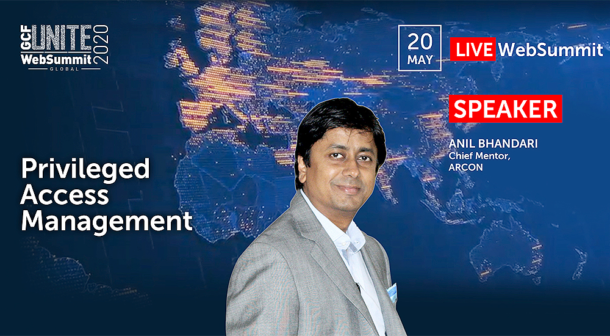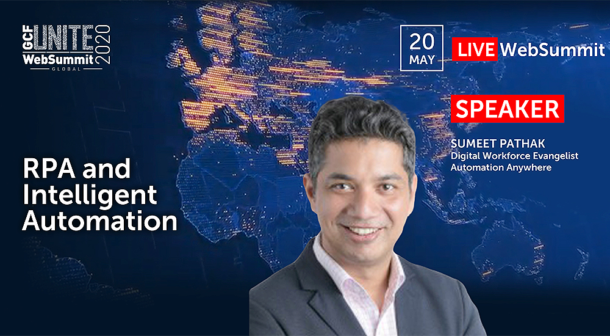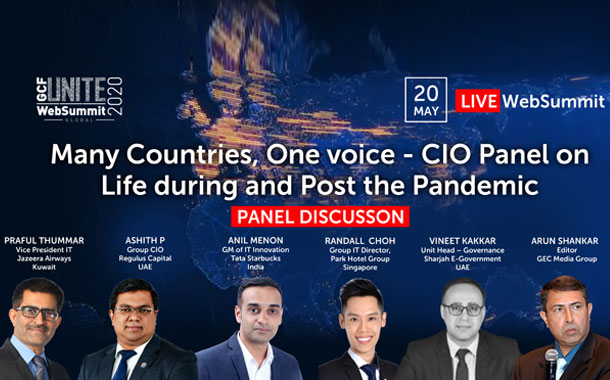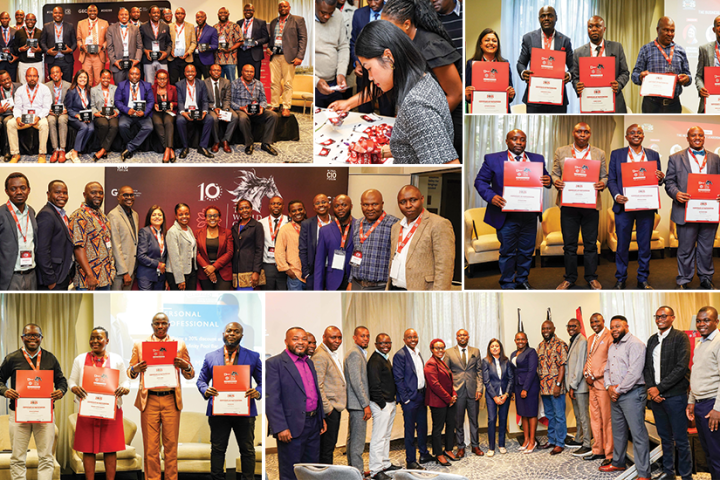Global CIO Forum successfully completed its half day websummit on the theme of Workforce Transformation, CIO Rethink and Reprioritise. The half day event was staged on 20 May on the GCF UniteWebSummit platform and saw more than 500 attendeesparticipating including CIOs, IT decision makers, IT Managers, and business heads from multiple regions including GCC, Middle East, Africa, India, South East Asia and the US.
GCF UniteWebSummit’s rapid go to market roll out has been supported by various sponsor partners including Appian, Exclusive Networks, Microsoft, Nutanix, Lenovo, Shure, Mindware, Dell Technologies, Citrix, Westcon, Automation Anywhere, Veritas, Finesse, Square One, TSME, ARCON, Juniper Networks, Datacentrix, and Share Technologies.

The opening keynote of the websummit was by Dr Khalid Saeed, Regional Advisor, Mental Health and Substance Abuse unit, Department of Non-Communicable Diseases and Mental Health, World Health Organisation. He spoke on the topic of mental health during the pandemic. Dr Saeed, pointed out, in much detail that stress and anxiety levels had gone up around the global population, and this must be recognised at the work place and in teams.
Excerpts from Dr Saeed’s slides describe this trend:
A national representative study in the Chinese population reported that almost 35% of respondents experienced psychological distress. A national study in Iran in March 2020 identified more than 60% of respondents in psychological distress. A national survey in the United States of America in March, reported that nearly half 45% of adults indicated that their mental health had been negatively impacted due to worry and stress over the virus. National surveys, local studies in Australia, Canada, Denmark, Ireland, India, Italy, Japan, and, South Africa all have reported that experiences on anxiety, depression, stress, and loneliness are widespread.
A study conducted among Italian and Spanish parents indicated that 86% of parents perceived changes in their children’s emotional state and behaviors – difficulty concentrating 77%, irritability 39%, restlessness 39%, nervousness 38% and feelings of loneliness 32%.
Statistics from Canada reported that 20% of the population aged 15-49 increased their alcohol consumption during the pandemic, and in Ireland, 40% increase in sales was observed in 4 weeks during March in comparison with similar period of previous year. Data from China suggest that frequent exposure to social media is related to anxiety, depression, and stress during the outbreak.

The next presentation was by Ajay Rathi, Director of IT, Dubai Healthcare City Authority, who presented how we need to rethink our workforce. Rathi pointed out that previously only 10% of the global workforce used to work remotely. He presented country-wise statistics on remote working with a baseline of March 2019. Today it is close to 100%. Because of this human resource policies of an organisation will change and workers will be measured on output and not on input, that is how many hours of work they put in. Rathi also presented the changing value system of the remote work force that will change human resource policies.

The next presentation was by Mohammed Abulhouf, Regional Sales Director, Saudi Arabia, Nutanix Middle East. Abulhouf spoke about the emergence of the multicloud and how vendor Nutanix is supporting the growth of hybrid cloud. Abulhouf explained that globally the adoption of public cloud has met with some limitations. Public cloud adoption is influenced by data gravity, installed base of legacy applications, regulatory restrictions, loss of application control, and unpredictable costs.
It is for this reason that Nutanix is advocating the usage of hyperconverged infrastructure to support the future, which is hybrid cloud. Hybrid cloud offers benefits of being scalable and elastic, performance sensitive, can support mission critical applications, can support cloud native applications, and offers predictable savings.

The next presentation was by Manoj Saxena, Chairman, RosettaNet Singapore, who spoke about the partnership with Global CIO Forum to launch the Global Technology Outlook Survey 2020. The global survey was launched on 20 May and will continue through the months of June and July, with early results for slicing and dicing in August and September. As an example, one of the objectives of this survey, using the results of the skills gap analysis, will be to reduce the gap between the industry and education service providers,.
Saxena presented some of the representative questions of the survey that bring a 360-degree approach into the survey including: What has been the greatest impact to your operation and how are you preparing to respond to this unprecedented pandemic; Who does your Chief Information Officer or Head of IT report to; What is the key success factor a CIO is measured in an organisation; What are the biggest challenges for adopting Industry 4.0; Where do you see the biggest gap in the skills for digital transformation; What is the % of IT budget that an organisation should spend to be future ready; Where is agile applied in the organisation.

Anil Bhandari, Chief Mentor, ARCON, pointed out that the ongoing pandemic has created the concept of social distancing. Amongst the newer generation this was already prevalent. However, according to Bhandari, the pandemic and social distancing is triggering amazing transformation. This has created work from home, learn from home, and earn from home. He pointed out that while travel has come to a halt, we can also commute. And the biggest competitor for airlines that has emerged in the last two months is video conferencing, which will soon have augmented and virtual reality added to it. Zoom has transported 300 million users in the last few months and its valuation had jumped to $45 billion.
The pandemic is also driving transformation of business models, where having access is more important than ownership. According to Bhandari, the requirement is now to have secure access to anytime, anywhere, to anything, with any device. This requirement can be met by building a secure virtual access layer. He points out that is similar to working in cloud, without having cloud.

In the next presentation, Krishnan Gopi, Chief Disruption Officer, GEMS Education, opened by pointing out that the classroom of the 1900s and 2000s have not changed much. This is an indication, that transformation in this sector is long overdue. Transformation in the education sector is now being driven by technology giants, education technology vendors, and school groups.
During 2018-2019, the GEMS Education Group, was fixing fundamentals including information security and single source of truth. During 2019-2020, it was strengthening building blocks with close to 20 million online sessions. During 2020-2021 it will accelerate transformation. The future of education will be more experiential than theory. It will include advanced analytics, machine learning and Internet of Things, delivered through augmented and virtual reality, with credentials verified through blockchain. Gopi pointed out that the pandemic has now accelerated this adoption.
His key takeaways include awareness that today’s curriculum needs to change; the future of education is tech-enabled; listen to your key stakeholders; work with regulators for new products and service offerings; and enhance information security controls.

In the next presentation, Venkatesh Mahadevan, CIO, Dubai Investments, revealed that for CIOs, things may have changed for the better. He said, that when we resume work, the blueprint to move forward will not be the same. CIOs will need to revisit the documents they prepared three to four months ago, while the world has gone on leave. It will be useful to enter into partnership with vendors, since both vendors and CIOs are going on this journey together. There is going to be a paradigm shift in how we do business.

The world is changing because of the pandemic, pointed out Dr Erdal Ozkaya, Regional Head of Information Security, Standard Chartered Bank, in the next presentation. The biggest security threat during this time is ourselves and the mistakes we make. A security threat is like the curfew during the pandemic, which is first imposed and then lifted and then imposed as preventive.
The three drivers for any cyberattack is for money, revenge, or war, pointed out Ozkaya during his presentation. While attackers need to find only one way to get in, the organisation has to protect all the doors. Attackers are always a step ahead. Attackers are usually patient, determined, insensitive, risk takers, careful, and deviant.

The next presentation was by Sumeet Pathak, Digital Workforce Evangelist, Automation Anywhere on the role of robotic process automation and automation during the pandemic. Pathak pointed out that three-fourth of the world continues to be in lockdown. Most organisations have now been arm twisted into thinking differently. Many have had no choice but to start their digital transformation journeys. And those with business continuity practices in place have been tested to the hilt, according to Pathak.
He pointed that recent surveys organised by Automation Anywhere have indicated that if robotic process automation is in place then additional investment into BOTS enabled business continuity may not be needed. Hence intelligent process automation helps to make an organisation more resilient. While the onset of Covid-19 has not left organisations any choice, Pathak emphasised that mindset of the workforce is a big challenge for adoption of intelligent automation in legacy organisations.
The new go to market of Automation Anywhere in the face of the pandemic is to be efficient for the pharmacy, government, healthcare, hospital, market segments. To help the market segments of hospitality, airlines and SMEs to survive. And to save the banking and insurance market segments. The continuing approach of Automation Anywhere is to look after the well-being of its customers, well-being of its staff, and well-being of its customer’s customers.

In a detailed presentation, Partha Banerjee, Group IT Manager, Safeer Group, stated that the changes that have taken place due to the pandemic are not big, they are seismic. The seismic changes reshaping consumer industries have accelerated and will have lasting impact on the way people shop and what they buy.
Excerpts from Banerjee’s slides describe these trends:
Shopping experience can get improved if retailers integrated their online and in-store offerings more effectively. The improvement would be an estimated 34% better in-store shopping experience if they could access real-time personalised offers on their mobiles, or could see in-store screens showing a wider range of products.
Investing in a well synchronised on-line platform for a better shopping experience for the customer would be one of the key capex influencers. Online businesses typically show losses in the beginning as shipping, packaging and marketing expenses eat into their margins. Therefore price points and margins are the key factors for ensuring a successful online business model.
The global pandemic has led to a third of consumers experiencing some sort of lockdown, and significant supply and demand volatility. Customers are now buying more at a time rather than buying frequently. A large part of the population has already resorted to on-line ordering and e-commerce. Even small shops are going online and accepting orders through social media like WhatsApp.
Food and consumer companies are struggling to keep up with demand from panic buying, but non-essential stores are closing either voluntarily or due to containment measures which have disrupted supply chains, production, and consumption. Digital channels are backing up, as spiking demand tests existing capabilities.
With more people working remotely emotional intelligence, self-regulation and self-awareness are considered prized attributes of the employees. Workplaces are getting adapted to suit variable work patterns and variable schedules. Retail companies have started to invest on the orientation of their work force that can be given the option to work from home.

In the closing keynote, Dr Jassim Haji, President Artificial Intelligence Society Bahrain, emphasised that artificial intelligence is not being leveraged sufficiently to assist the first responders in controlling the pandemic. Machine learning can be used to evaluate and optimise strategies for social distancing between communities, cities, and countries to control the spread of epidemics, detecting pattern, forecasting and predicting.
Excerpts from Haji’s slides describe these trends:
Artificial intelligence can pinpoint patterns in an ocean of data and make predictions. Hence artificial intelligence can identify drug prospects to test on humans within months. Artificial intelligence can also speed up vaccine development, using large quantities of accurate training data. Artificial intelligence can also be used to identify commonalities within localised outbreaks of the virus, or with micro-scale adverse health events that are out of the ordinary. Artificial intelligence does not just predict that a disaster will happen but forecasts where it will have the most impact, which systems are likely to fail, and what communities are in most danger.
Today, nearly all social media platforms rely on machine learning algorithms for advertising. Artificial intelligence functionality could be of great assistance during disasters, helping both ordinary people and first responders keep up to date and remain organised. Artificial intelligence could be used to scrape information from millions of social media posts and clue rescue workers into reaching the hardest hit areas and people in most need.

The websummit also included a panel discussion with five top executives across multiple regions. The theme of the panel discussion was about, life during and after the pandemic. The participating executives included Praful Thummar, Vice President of IT Jazeera Airways; Ashith P, CIO Regulus Capital; Anil Menon, General Manager of IT Innovation, Tata Starbucks; Randall Choh, Group IT Director, Park Hotel Group; and Vineet Kakkar, Unit Head of Governance, Sharjah e-Government.
The five executives were invited to share their experiences across the impact of the pandemic in their market segments; the types of business partnerships that have been put in place to maintain the momentum of business during the pandemic; and examples of how agile applications and technologies have been rebuilt to reposition business in the market place. As a disclaimer, the participants of the panel shared their comments reflecting their personal opinion and not necessarily the position of their organisation.
While Global CIO Forum and GCF UniteWebSummit have completed 45 events in 45 days, Samantaray points out that the rapid go to market activities will continue and many such exciting events are expected in the months ahead.
























